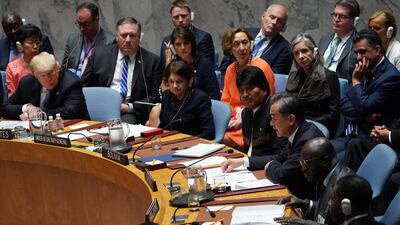US President Donald Trump had Iran in his sights for a second day at the UN on Wednesday as he chaired a Security Council meeting in which he urged the world to eliminate weapons of mass destruction and claimed China is interfering his country’s upcoming midterm elections.
Chairing a UN Security Council meeting for the first time, Mr Trump focused on the use and trade of nuclear, biological and chemical weapon around the world.
Arriving 20 minutes late to a full room, he began in a similar vein to his opening speech to the General Assembly the day before – by lauding the achievements, this time in Syria.
The Trump administration has twice bombed Syria’s Assad regime in response to the use of chemical weapons on civilians. Most recently in April, the US was supported in their limited strikes by the UK and France.
He then condemned allies of embattled President Bashar Al Assad, saying “the Syrian regime’s butchery is enabled by Russia and Iran”.
But Mr Trump then swiftly turned to thanking Iran, Russia and Syria for halting their offensive on the Syrian province of Idlib, a de-escalation zone that has become home to over 3 million people.
That was Russia's only mention in his speech, but he returned to condemning Tehran’s use of “terror and turmoil”. His strong stance against the Islamic Republic follows on from his speech on Tuesday and the talking points of several senior US officials.
“The Iranian regime exports violence, terror and turmoil, it illicitly procures sensitive items to advance its ballistic missile programme and proliferates these missiles all over the Middle East,” he said.
Mr Trump, during his speech at the General Assembly, asked nations to isolate Iran’s regime while supporting its people. The President said he would not be engaging in talks with the Iranians after withdrawing from the 2015 Iran nuclear deal, where he said that Tehran “was in big, big, trouble, they needed cash” and that during the administration of his predecessor Barack Obama’s administration “we gave it to them”.
______________
Read more:
Donald Trump says Israeli-Palestinian peace plan to be announced within months
Trump puts Iran's regional aggression at centre of UNGA speech
Leaders of Yemen, Lebanon and Afghanistan speak at UNGA
______________
With those funds, he said, Tehran sponsored terrorism throughout the Arab world, developed nuclear capabilities and pursued policies of destabilizing the region.
“A regime with this track record must never be allowed to possess a nuclear weapon,” he said regarding his decision to pull the US administration out of the 2015 Joint Comprehensive Plan of Action or Iran nuclear deal.
The US administration will impose fresh sanctions on Iran in early November with Mr Trump claiming more will follow after the resumption of the economic measures.
“Any individual or entity who fails to comply with these sanctions will face severe consequences, I ask all members of the Security Council to work with the United States to ensure the Iranian regime changes its behaviour,” he said.
Mr Trump then said that China has been attempting to interfere with the upcoming midterm elections taking place in November.
“They do not want me or us to win, because I am the first president to ever challenge China on trade. We are winning at trade, we are winning at every level,” he said.
The comments on China come as special counsel Robert Mueller continues to delve into suspected Russian interference in the 2016 presidential election and ties between the Trump campaign and agents of Moscow.
Speaking at the meeting, the British Prime Minister Theresa May said that the work to eliminate chemical weapons had been tested, despite the Security Council and the UN’s efforts.
Ms May condemned the use of chemical weapons in Syria, Malaysia and the UK and claiming “predictability and stability are declining”.
She said the role of the UN Security Council to address these issues is being challenged, adding that “it is regrettable that Russia continues to prevent the council to uphold its responsibility to stop these destabilizing activity”.
She said that the situation in Syria, as well as being a humanitarian disaster, poses “grim consequences in the erosion of global norms in weapons of mass destruction”.
“The UN has concluded that Assad’s regime has repeatedly used chemical weapons a direct assault on a nearly century-old ban vital to our collective peace and security, yet Russia has repeatedly wielded its veto,” she said.
Russia has blocked moves by the Security Council to hold the Syrian regime to account and even went as far as shutting down the international body established to investigate chemical weapon use in Syria.
The Prime Minister echoed Mr Trump’s concerns about Iran’s missile capabilities.
But, on Iran’s nuclear capabilities, Ms May struck a different tone than her American counterpart, saying that the JCPOA was the answer to a situation in Iran that was increasingly troubling,
“It was an important step forward in addressing these [concerns] it remains the best means of preventing Iran to developing a nuclear weapon, and we are committed to the JCPOA as long as Iran continues to abide,” she said.

